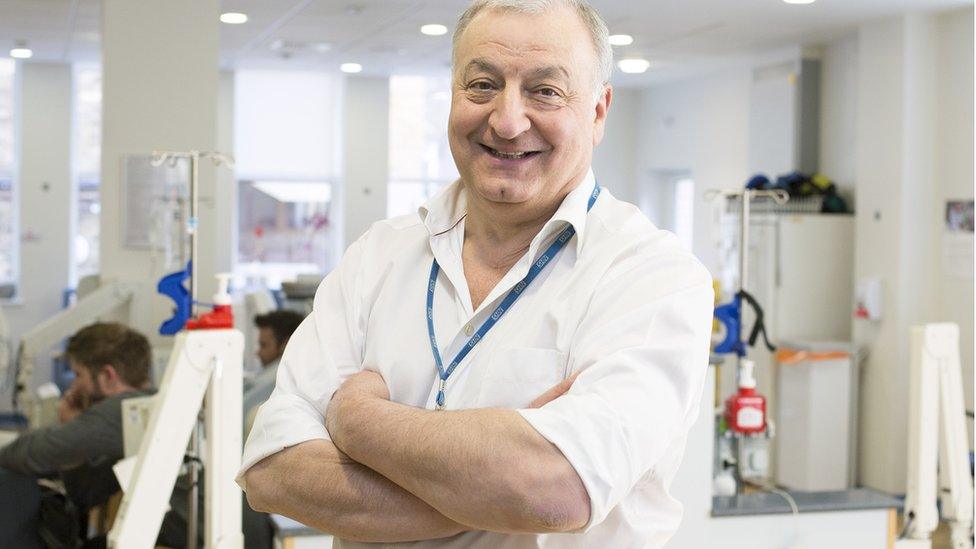Royal Marsden's leading cancer expert Martin Gore dies
- Published

Tributes have been paid to one of the world's leading oncologists, who has died at the age of 67.
Martin Gore was a professor at the Institute of Cancer Research and also worked at the Royal Marsden Hospital.
The Duke of Cambridge once described him as an inspiration, and the Royal Marsden's chief executive said he had "inspired generations" of doctors.
The cause of his death is not known. The Times reported he died suddenly following a yellow fever , externalvaccination.
Prof Gore was an oncologist for more than 35 years, researching ovarian cancer, melanoma and renal cell carcinoma.
He worked at the Royal Marsden Hospital for over 30 years and was made its medical director in 2006.
The cancer expert was made a CBE in the Queen's birthday honours in 2016 for services to oncology.
Prof Gore was also awarded the The Royal Marsden's Lifetime Achievement Award in 2015.
At the time, the Duke of Cambridge, who is the president of the Royal Marsden, described Prof Gore as "one of the pioneers of 20th Century cancer care, and a friend, colleague and a trusted doctor to many" and hailed his "compassion and kindness".
'Force of nature'
Prof Justin Stebbing, professor of cancer medicine at Imperial College, worked for Prof Gore in 2000.
He said: "He was like a father figure to all the registrars - I didn't realise until I became a consultant he was the same to them too.
"I remember the detail he went into with everyone and everything, and the team spirit he fostered."
Prof Mel Greaves, from The Institute of Cancer Research, said: "Martin was something of a force of nature, very energetic, clear thinking and compassionate."
The Times said he had suffered total organ failure soon after having a yellow fever vaccination, although the cause of death has not been confirmed.
The NHS recommends the yellow fever jab, external for people who are travelling to areas where the illness is found, including most of sub-Saharan Africa, most of South America, and parts of Central America and the Caribbean.
But the vaccination is not always recommended for some people, including:
people over the age of 60
people with weakened immune systems, such as those with HIV
people who are allergic to any of the ingredients in the vaccine, including people with an egg allergy
people with a disorder of their thymus gland
The NHS says there are some very rare side effects that can occur, including an allergic reaction and problems affecting the brain or organs.
"These occur less than 10 times for every million doses of vaccine given."
Prof Peter Openshaw, past president of the British Society for Immunology, said the overall risk of serious side-effects from the vaccination remains very low, at about one in every 100,000 of vaccine recipients.
However, he added: "It seems that people aged over 60 have a three to four-fold increased risk of experiencing these serious effects compared with younger people. However, this estimate is based on very few reported adverse events.
"This risk has to be balanced against the risk of contracting yellow fever if you are travelling to an infected area - a nasty disease with a high mortality rate."
He said the Medicines and Healthcare Products Regulatory Agency (MHRA) was the UK body charged with looking into adverse side-effects reported from vaccines.
"They will undoubtedly conduct a proper analysis of this case to ensure it was caused by the vaccine rather than an incidental unconnected cause, such as sepsis."